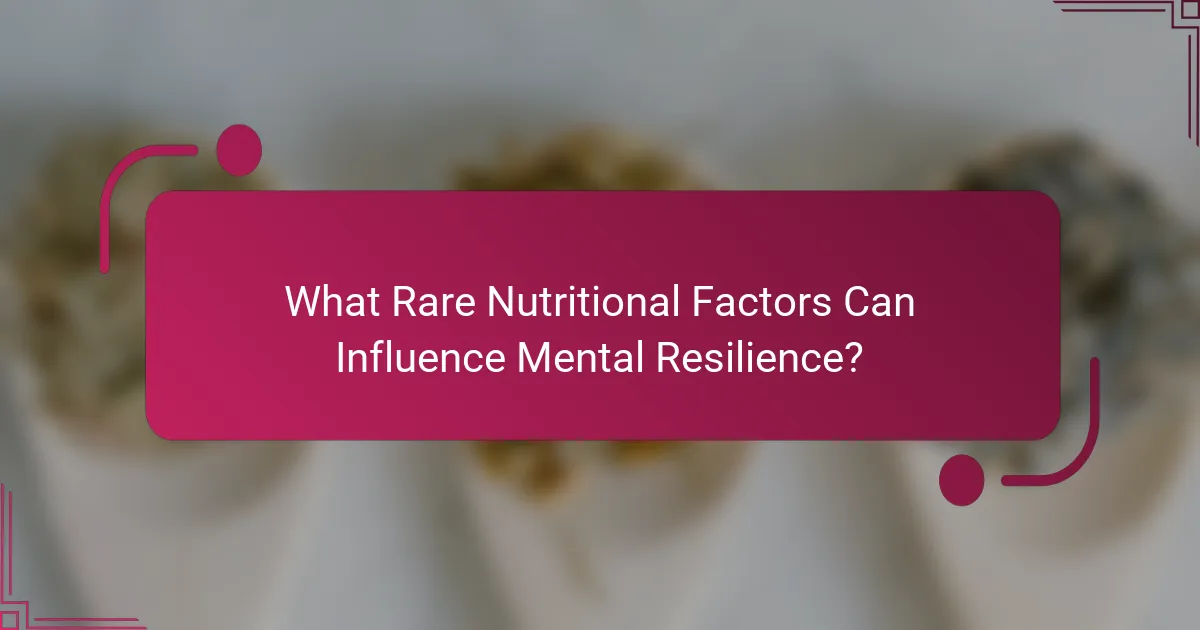Nutrition plays a crucial role in enhancing mental resilience in young athletes. A balanced diet improves cognitive function, reduces anxiety, and supports emotional stability. Key nutrients like omega-3 fatty acids and antioxidants contribute to better mood and focus. Proper hydration and regular meal timing further bolster mental performance during training and competition.

How Does Nutrition Influence Mental Resilience in Young Athletes?
Nutrition significantly enhances mental resilience in young athletes by providing essential nutrients that support cognitive function and emotional stability. Proper intake of carbohydrates, proteins, vitamins, and minerals can improve focus, reduce anxiety, and boost overall mental performance. For example, omega-3 fatty acids found in fish are linked to improved mood and cognitive clarity. In addition, hydration plays a crucial role; even mild dehydration can impair concentration and mental agility. A balanced diet not only fuels physical performance but also fortifies the mental toughness required for competitive sports.
What Are the Key Nutritional Components for Mental Resilience?
Nutrition significantly influences mental resilience in young athletes. Key nutritional components include omega-3 fatty acids, antioxidants, and hydration. Omega-3s, found in fatty fish, enhance cognitive function and mood stability. Antioxidants, present in fruits and vegetables, combat oxidative stress, supporting brain health. Proper hydration is crucial for cognitive performance, as even slight dehydration can impair focus and decision-making. Prioritising these nutrients can foster stronger mental resilience in young athletes.
Which Vitamins and Minerals Are Essential?
Essential vitamins and minerals for young athletes include B vitamins, vitamin D, calcium, and magnesium. These nutrients support energy metabolism, bone health, and muscle function.
B vitamins, such as B6 and B12, are crucial for energy production and cognitive function. Vitamin D enhances calcium absorption, vital for strong bones. Calcium is necessary for muscle contractions, while magnesium aids in muscle recovery and reduces fatigue.
Research indicates that deficiencies in these nutrients can negatively impact performance and mental resilience. Young athletes should focus on a balanced diet rich in fruits, vegetables, whole grains, and lean proteins to meet their nutritional needs.
How Do Macronutrients Affect Cognitive Function?
Macronutrients significantly influence cognitive function by providing essential energy and nutrients for brain health. Carbohydrates are vital for immediate energy, while proteins supply amino acids necessary for neurotransmitter synthesis. Fats, particularly omega-3 fatty acids, support brain structure and function. Young athletes benefit from a balanced intake of these macronutrients, enhancing mental resilience and performance during training and competition. Studies show that adequate nutrition positively correlates with improved focus, memory, and overall cognitive abilities.
What Role Does Hydration Play in Mental Performance?
Hydration significantly enhances mental performance by improving focus, cognitive function, and mood stability. Young athletes require optimal hydration to maintain peak mental resilience during training and competition. Studies indicate that even mild dehydration can impair attention and memory, crucial for athletic success. Ensuring adequate fluid intake supports brain health, enabling better decision-making and reaction times.

What Are the Universal Benefits of Proper Nutrition?
Proper nutrition significantly enhances mental resilience in young athletes. Balanced diets rich in essential nutrients improve cognitive function, reduce stress, and enhance focus. For instance, omega-3 fatty acids found in fish support brain health, while antioxidants from fruits and vegetables combat oxidative stress. Consistent nutritional intake fosters better mood regulation, leading to improved performance during competitions. Ultimately, proper nutrition serves as a foundational pillar for mental strength and endurance in young athletes.
How Does Nutrition Support Overall Athletic Performance?
Nutrition directly enhances mental resilience in young athletes by providing essential nutrients that support cognitive function and stress management. Balanced diets rich in vitamins, minerals, and omega-3 fatty acids improve focus and reduce anxiety. For example, studies show that athletes with adequate carbohydrate intake perform better under pressure. Furthermore, hydration plays a crucial role in maintaining optimal brain function, impacting decision-making during competitions. A well-rounded nutrition plan fosters not only physical strength but also emotional stability, essential for peak performance.
What Psychological Benefits Are Associated with Balanced Diets?
A balanced diet significantly enhances mental resilience in young athletes. Nutritional intake directly influences mood, cognitive function, and stress management, fostering better performance. Research indicates that diets rich in omega-3 fatty acids improve brain health, while antioxidants from fruits and vegetables reduce oxidative stress. Additionally, proper hydration is crucial for maintaining focus and reducing fatigue. Overall, a nutritious diet supports emotional stability, enabling young athletes to cope with competitive pressures effectively.

What Unique Nutritional Strategies Can Enhance Mental Toughness?
Nutrition can significantly enhance mental toughness in young athletes through specific dietary strategies. A focus on complex carbohydrates, lean proteins, and healthy fats supports brain function and emotional regulation. For example, omega-3 fatty acids found in fish improve cognitive performance and resilience. Hydration is also crucial; even mild dehydration can impair focus and mood. Incorporating micronutrients like magnesium and zinc, found in nuts and seeds, can further bolster mental resilience. Regular meal timing and balanced snacks can stabilize energy levels, contributing to sustained concentration during training and competition.
How Can Timing of Meals Impact Performance?
Meal timing significantly affects the performance of young athletes by optimizing energy levels and mental focus. Consuming meals at strategic times enhances nutrient absorption and sustains stamina during training and competitions. Research indicates that athletes who eat balanced meals before training exhibit improved cognitive function and reaction times. For instance, a study found that eating a carbohydrate-rich meal two hours before exercise can enhance endurance and concentration. Proper meal timing also helps regulate blood sugar levels, preventing fatigue and maintaining motivation.
What Are the Effects of Specific Diets on Young Athletes’ Mental Resilience?
Nutrition significantly influences mental resilience in young athletes. Diets rich in whole foods, such as fruits, vegetables, and lean proteins, enhance cognitive function and emotional stability. For instance, omega-3 fatty acids found in fish support brain health, while complex carbohydrates provide sustained energy, crucial for maintaining focus during training and competitions.
Moreover, hydration plays a vital role in mental clarity and mood regulation. Dehydration can lead to fatigue and decreased concentration, negatively impacting performance. Additionally, micronutrients like zinc and magnesium are essential for optimal brain function and stress management.
Athletes who adopt balanced diets exhibit greater mental toughness, enabling them to cope with challenges and pressure during competitions. In contrast, poor dietary choices may lead to mood swings and decreased motivation, hindering athletic performance. Thus, a well-rounded nutrition plan is fundamental for fostering mental resilience in young athletes.

What Rare Nutritional Factors Can Influence Mental Resilience?
Certain rare nutritional factors can enhance mental resilience in young athletes. Omega-3 fatty acids, particularly DHA, support cognitive function and emotional regulation. Antioxidants like astaxanthin, found in certain algae, may reduce oxidative stress, positively influencing mood. Magnesium plays a crucial role in neurotransmitter function and can alleviate anxiety. Additionally, probiotics have been linked to improved gut-brain communication, potentially enhancing mental health.
How Do Adaptogens Affect Stress and Recovery in Young Athletes?
Adaptogens can significantly enhance stress management and recovery in young athletes. These natural substances, such as ashwagandha and rhodiola, help regulate the body’s stress response, leading to improved mental resilience. Research indicates that adaptogens may lower cortisol levels, promoting better recovery times and overall performance. Additionally, they can enhance focus and endurance, which are crucial for young athletes facing competitive pressures.
What Unique Foods Have Been Linked to Enhanced Cognitive Function?
Certain unique foods enhance cognitive function in young athletes. For example, blueberries contain antioxidants that support brain health. Fatty fish, rich in omega-3 fatty acids, improve memory and cognitive performance. Dark chocolate boosts blood flow to the brain, enhancing focus. Nuts and seeds provide essential nutrients that aid mental clarity. Leafy greens, high in vitamins, contribute to overall brain health. Lastly, whole grains maintain steady energy levels, supporting sustained cognitive function.

What Best Practices Should Young Athletes Follow for Optimal Nutrition?
Young athletes should prioritise a balanced diet rich in whole foods for optimal nutrition. Consuming adequate carbohydrates fuels energy levels, while proteins support muscle repair and growth. Healthy fats contribute to brain function, enhancing mental resilience. Hydration is crucial; even mild dehydration can impair cognitive performance. Regular meals and snacks help maintain stable energy levels and focus during training and competition. Nutrient timing, particularly post-exercise, aids recovery and mental clarity. Engaging in mindful eating practices fosters a positive relationship with food, reinforcing mental strength.
What Common Nutritional Mistakes Should Be Avoided?
Young athletes should avoid common nutritional mistakes that can hinder their mental resilience. Prioritising balanced meals is essential; skipping meals or relying on processed snacks can lead to energy crashes and decreased focus.
Hydration is critical; inadequate fluid intake can result in fatigue and impaired cognitive function. Additionally, neglecting macronutrient balance—especially protein and healthy fats—can affect mood and performance.
Over-restricting calories can also be detrimental, as it may lead to nutrient deficiencies, impacting overall mental health. Lastly, ignoring individual dietary needs and preferences can result in a lack of motivation to maintain healthy eating habits.
How Can Young Athletes Create a Balanced Meal Plan?
Young athletes can create a balanced meal plan by incorporating a variety of nutrient-dense foods. Focus on whole grains, lean proteins, healthy fats, and plenty of fruits and vegetables. This approach supports both physical performance and mental resilience.
Incorporate complex carbohydrates like brown rice and quinoa to provide sustained energy. Include lean proteins such as chicken, fish, or plant-based sources to aid muscle recovery. Healthy fats from avocados and nuts are essential for brain health and overall well-being.
Aim for hydration as well, as water plays a critical role in cognitive function and physical performance. Young athletes should drink water throughout the day, especially before, during, and after exercise.
Lastly, consider timing meals around training sessions. Eating a balanced meal or snack 1-3 hours before exercise can enhance performance and mental focus.
What Expert Tips Can Enhance Nutritional Impact on Mental Resilience?
Nutrition significantly enhances mental resilience in young athletes through specific dietary strategies.
1. Prioritise omega-3 fatty acids for improved cognitive function; sources include fatty fish and walnuts.
2. Include complex carbohydrates to stabilise blood sugar levels, which supports mood and focus; opt for whole grains and legumes.
3. Hydration is crucial; even mild dehydration can impair cognitive performance, so encourage regular water intake.
4. Incorporate a variety of fruits and vegetables for essential vitamins and antioxidants, which combat oxidative stress on the brain.
5. Regular meals and snacks can prevent energy dips, maintaining consistent mental performance throughout training and competition.
6. Consider timing of nutrient intake; consuming protein and carbohydrates post-exercise aids recovery and cognitive function.